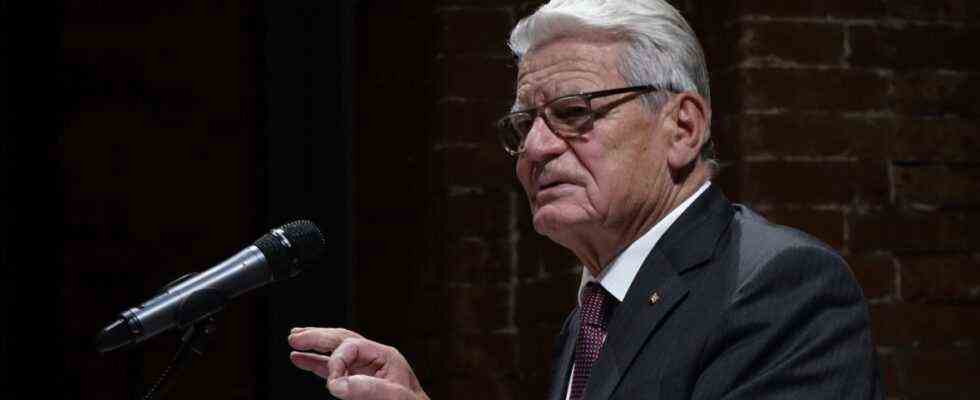What do you have to endure and when is it enough? At the end of this evening, Joachim Gauck found a clear answer to this. “We need an advertising cooperation”, at least in principle, says the 81-year-old former Federal President at first. But when all the discussion does not help, all the arguing and all the advertising, “when all is useless and I know: I am dealing with scoundrels,” says Gauck. “Then: intolerance!”
It is a combative appearance that Joachim Gauck made this Tuesday evening in the All Saints Court Church of the Munich Residence. There is also a lot at stake. The number of anti-Semitic crimes has been increasing for years, including in Bavaria. The representative of the Free State against Anti-Semitism, Ludwig Spaenle, and the President of the Ludwig Maximilians University, Bernd Huber, have now invited Gauck to speak about tolerance – and about its limits, in view of the increasing hatred of Jews. In the hall, which is airy due to the corona, there are now many younger listeners: young journalists, young police officers, schoolchildren. And the former Federal President encourages them to argue.
Gauck does not even talk about recent incidents, attacks on synagogues or anti-Semitic banners at demonstrations against corona measures. On this evening he draws a wide arc, speaks of the 1700 years of Jewish life in the area of present-day Germany, which will be celebrated this year. But the whole story, says Gauck, was essentially one of intolerance. Any form of anti-Semitism deserves anger and indignation, he says. The fact that Jewish people even wanted to live in Germany again today, in a country “where murderers used to rule,” he called a democracy miracle. Another motive should be at the center of this evening: tolerance.
It was two years ago that Gauck wrote an entire book about this term and its pitfalls. It’s called “tolerance, just difficult” because sometimes he felt how normal it was to be tolerant, explains Gauck. And how difficult at the same time to keep up with it all the time.
But do you have to? On this evening, the former Federal President pleads for “fighting tolerance”, as he calls it, that is, for self-confidence and the courage to deal with things. One shouldn’t confuse tolerance with a “do what you want” attitude, he says. At home in Berlin, he often came across this attitude, but that was not tolerance, that was indifference, “a certain amount of dignified insistence”. Harmony is not an end in itself, in a diverse society it cannot only be harmonious. Quarrel is part of the breath of life in a living democracy: inhaling is the search for a consensus, and exhaling is the dispute.
With who? On this evening Gauck speaks not only of quarrels with anti-Semites or right-wing extremists, for example from the AfD, a party “that many of us think is superfluous, for example me”, and not between ethnic nationalists and “homeless conservatives” differentiate, as Gauck says. He also speaks of left-wing extremists, Islamist fanatics and immigrants who reject the Basic Law and the freedom rights enshrined in it. “If people persistently act against behavior that has been practiced in civilization, we are allowed to intervene,” says the former Federal President. “We should argue. And not just pretend. We want to win too!” Even the Weimar Republic perished because there were no democrats to defend it.
And this fighting tolerance also has a limit, warns Gauck. The “ability to be intolerant” also belongs in the minds of the Democrats. It is true that one should not label all voters of right-wing populist parties as Nazis, but tolerance is wrong with those who themselves preached intolerance, hatred and misanthropy. “We will not be able to save our democracy in the sleeping car, and not even as spectators,” says Gauck. “Tolerating and defending belong together.”

